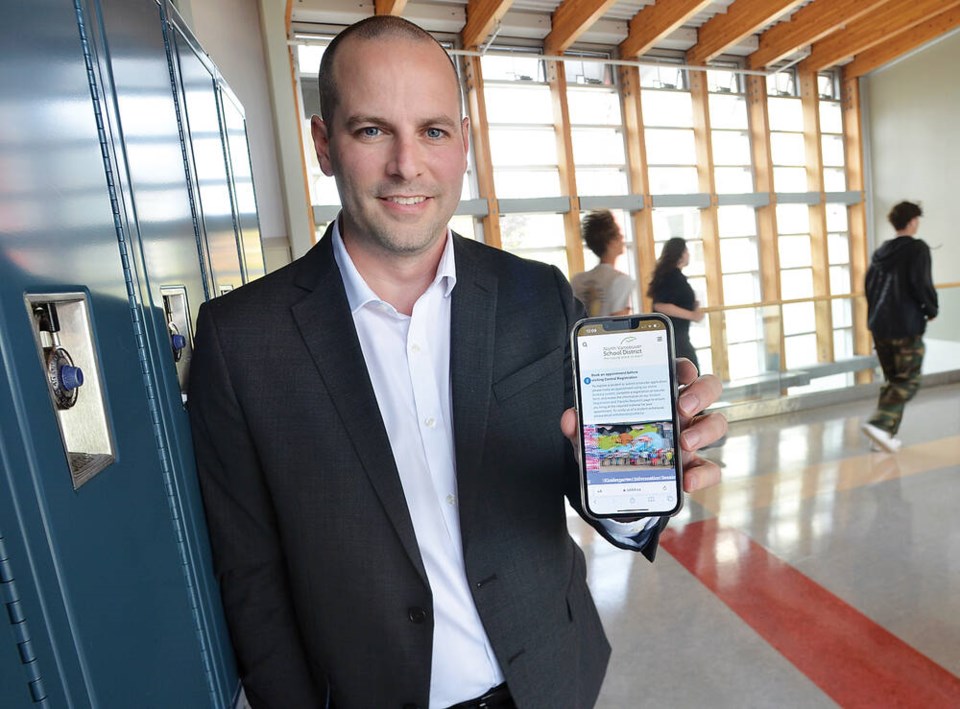As a new school year gets underway, students at Sutherland Secondary are getting reminded that there’s a time and place for SnapChat, and science class isn’t it.
In some classrooms, cellphone ‘pockets’ where students stash their devices during class help remove temptation. Some teachers have been known to use Tupperware bins to keep their students’ ubiquitous cellphones out of sight and out of mind in class.
It’s not a cellphone ban exactly, says Sutherland principal Mark Barrett.
“There’s a time and a place for technology. We’re not Luddites. We’re not banning things,” he said. But during class time, at least “the default expectation is the phone is away and it’s off,” he said.
Neither the North nor West Vancouver school districts have explicit policies on student cellphone use in schools, although both have expectations about ‘acceptable use’ of technology while on the school network. Generally, that translates into no viewing or posting of offensive online content and no scrolling Instagram during math or social studies class.
A letter recently sent out to Sutherland families reminding them of their technological manners comes at a time when teens’ cellphone use in schools has been garnering more attention.
In 2019, the Ontario government brought in a province-wide ban on cellphone use in classrooms.
So far B.C. hasn’t followed suit, preferring to leave that to local school districts or schools to decide.
In North and West Vancouver, regulating cellphone use in classrooms has been up to either individual schools or classroom teachers.
Parents keen on cellphone controls
Barrett acknowledged he’s seen growing interest from both teachers and parents to manage the time teens spend on their devices. “Even at home, I think families and parents are struggling to get their kids off their devices,” he said.
Last year, when Barrett was principal at Handsworth, “I definitely got emails from parents asking for a greater degree of intervention in students’ cellphone use,” he said.
The pivot to hybrid and online learning during the pandemic didn’t help, said Barrett. “There was so much more screen time.”
Following that, kids are having to re-learn some normal social interaction, said Barrett, and even some basic rules around social etiquette. “Like when people are having a conversation, you don’t bury your face in your phone.”
Barrett said reinforcing expectations around cellphone use school-wide makes sense, so students don’t get into the situation where “Teacher A is doing it and Teacher B isn’t doing it.”
Another benefit of making cellphones off limits to everyone during class time is “there’s no sense that kids are missing out on anything,” he said. “Whereas if you’re the only person who doesn’t have their phone, or even your class doesn’t have their phones, it’s like, ‘Oh man, I’m missing out on the TikTok that the students down the hall are posting.’”
Cellphones in class 'distracting'
Karin Kirkpatrick, the BC United MLA for West Vancouver-Capilano, said her party would like to see cellphone use restricted in schools province-wide. Research shows “when cellphones are banned or they’re limited, you’re going to see improved attention and better grades and a better sense of school community,” she said.
“So, we’re looking around to see what’s working best in other jurisdictions where they’ve decided to do this,” she said.
Kirkpatrick said in her own experience teaching older students at UBC, she found students’ use of cellphones in class distracting. “You never knew if they were looking at a YouTube video or taking notes on the phone,” she said.
Barrett said at the same time, there is a place for technology in the classroom. Equally important is that students learn to self-regulate when it comes to their devices – without having someone else tell them when it is or isn’t appropriate. “There should be times when you use your own discretion,” he said.


